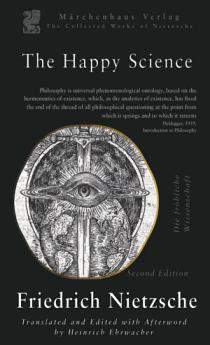The Happy Science: A New Reader's Edition
May 2024 · The Collected Works of Friedrich Nietzsche Book 31 · Marchen Press
Ebook
421
Pages
family_home
Eligible
info
reportRatings and reviews aren’t verified Learn More
About this ebook
"The Happy Science", sometimes translated as "The Gay Science" or "The Joyful Science" is a pivotal work in which Nietzsche further develops his critique of traditional values and his vision of a life-affirming philosophy beyond the Pessimistic outlook on reality he inherited from Schopenhauer. The book is known for its proclamation of the "death of God" and the challenges it poses to the foundations of morality and religion. In this work, Nietzsche emphasizes the importance of embracing uncertainty and creating one's own values, advocating for a joyful and creative approach to life. The Happy Science is notable for its aphoristic style and its blend of poetic and philosophical elements, echoing Nietzsche's belief in the interconnectedness of art and philosophy, and is one of the most elegant books of Nietzsche. Written while he was living in Genoa, Italy, the text is notable for its aphoristic style (borrowed from Schopenhauer, who borrowed from Rabelais and Erasmus) and its exploration of themes such as the affirmation of life, the death of God, and eternal recurrence. "Die fröhliche Wissenschaft" was first published in Leipzig, Germany, in 1882 by the publishing house E. W. Fritzsch. Nietzsche's concept of the "happy science" refers to a joyful and liberated approach to philosophy, one that embraces the uncertainty and chaos of existence with a playful and creative spirit. The book includes famous passages such as "The Madman," which proclaims the death of God and examines the profound implications of this event for Western civilization. Camus would go on to create a watered-down version of this "positivist nihilism," all based on Schopenhauer's pessimism. The text marks a transition from Nietzsche's earlier, more skeptical and critical writings to a more affirmative and constructive phase of his philosophy. It foreshadows the themes he would develop in Thus Spoke Zarathustra, including the superman and the will to power. The work's cheerful and provocative tone reflects Nietzsche's call for a reassessment of values and a new way of thinking that transcends traditional moral and metaphysical constraints. This modern critical reader's edition offers a clear and accessible translation of Nietzsche’s original manuscript, using contemporary language and streamlined sentence structures to make his complex ideas easier to engage with. Designed for both general readers and students of philosophy, the edition includes a range of supporting materials to provide context and deepen understanding. These include an afterword by the translator discussing the historical reception and intellectual legacy of the work, an index of key philosophical concepts with emphasis on Existentialism and Phenomenology, a chronological list of Nietzsche’s published works, and a detailed timeline of his life, highlighting the personal relationships that influenced his thinking.
About the author
Friedrich Nietzsche (1844-1900) was a watershed German philosopher, cultural critic, poet, musician (briefly) and philologist (the study of ancient manuscripts) whose work has had a profound impact on modern intellectual history. Known for his critiques of European morality and religion (particularly Protestantism), Nietzsche's ideas on the "will to power" and the "Übermensch" have influenced a wide range of philosophical, literary, and psychological thought including thinkers such as Martin Heidegger, Albert Camus, Michael Foucault and the entire Postmodern religion.
Rate this ebook
Tell us what you think.
Reading information
Smartphones and tablets
Install the Google Play Books app for Android and iPad/iPhone. It syncs automatically with your account and allows you to read online or offline wherever you are.
Laptops and computers
You can listen to audiobooks purchased on Google Play using your computer's web browser.
eReaders and other devices
To read on e-ink devices like Kobo eReaders, you'll need to download a file and transfer it to your device. Follow the detailed Help Center instructions to transfer the files to supported eReaders.











